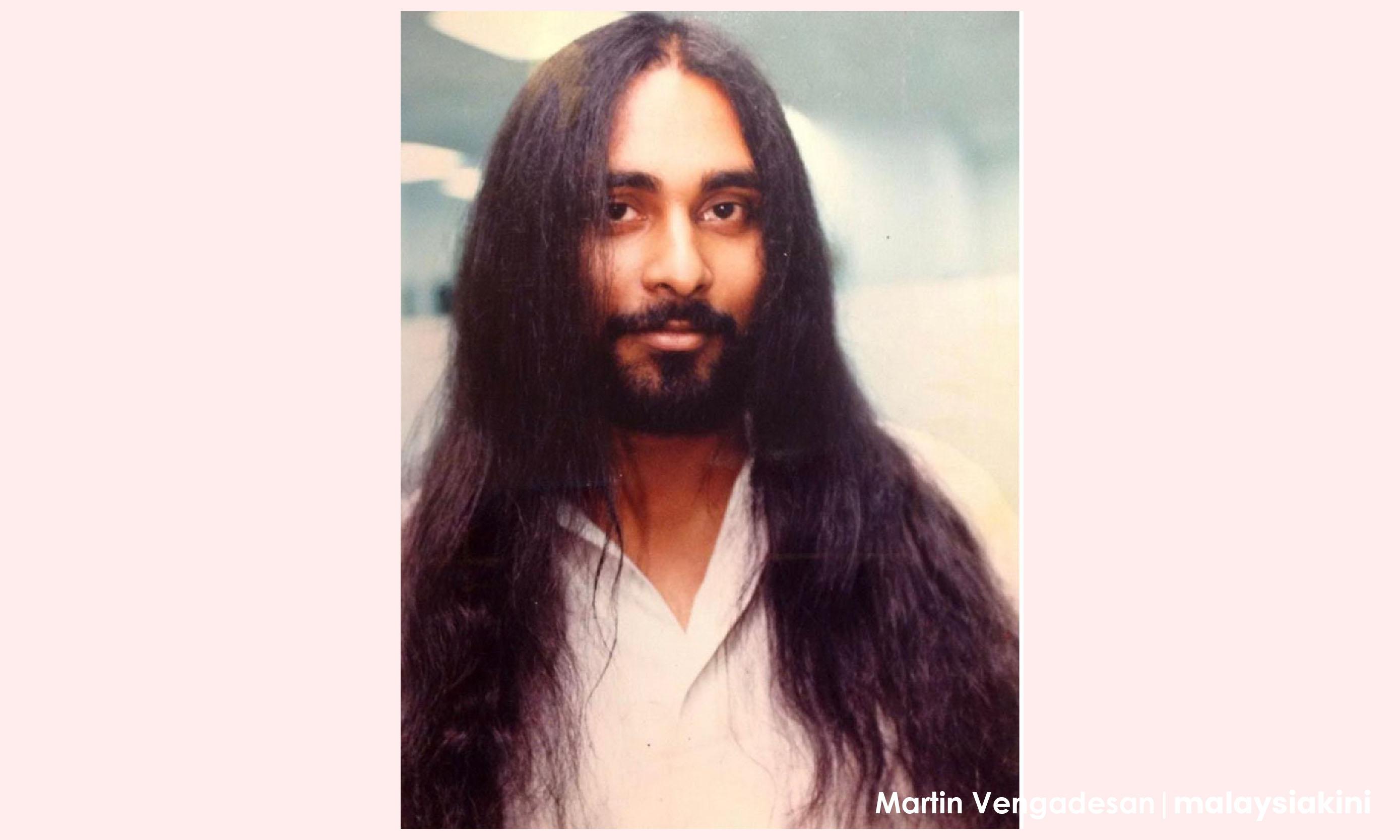Vengadesan reflects on soundtrack of his life with third book
Former entertainment reporter turned hard news editor Martin Vengadesan once nursed aspirations to become a full-time musician and saw writing as something he would only do before his career took off.
However, while his passion for music never died, he found his niche as a writer and hardcore journalist.
His third book “101 Albums You Need to Hear Before I Die” takes him back to his beginnings, the music that influenced him as a child and a young man, and eventually his path in life.
Vengadesan had already written two books. The first is the hugely successful non-fiction “Malaysian Murders and Mysteries”, co-authored with Andrew Sagayam, which is now in its fifth reprint and his second book is the dystopian thriller “Malaya 2057: A Thousand Moons Have Passed”.
He previously contributed to the books “March 8: The Day Malaysia Woke Up” and the “KL Noir” series.
He started working on “101 Albums You Need to Hear Before I Die” two years ago during the pandemic. He was also working on “Malaya 2057” which was published last year.
“101 Albums” will be available online on May 3 and in bookstores on May 6.
His band Martin Vengadesan and The Stalemate Factor’s fourth album will also be released this week, which coincides with his 50th birthday celebrations.
During an interview with Malaysiakini, the first question was naturally, why “101 Albums You Need to Hear Before I Die” instead of “Before You Die”?
“When I was growing up, there were a lot of those album lists with that kind of title. It is very common in the title, albums you need to hear before you die.

“So I just wanted to be cheeky and play with words. Before I die, meaning maybe you want to read it and you will listen to the albums and we can have a discussion,” explained Vengadesan.
Most personal book
Unlike his previous books, “101 Albums” is perhaps his most personal, as he described how he was introduced to certain music by his family members and friends, his own experiences meeting the musicians he idolised, and how the story behind the songs is what intrigued him more than the song itself.
The book is interesting on its own, capturing the music that moved him from the 1920s to 1973, the year he was born.
The first chapter is on blues legend Bessie Smith with her single ‘Nobody Knows You When You’re Down And Out’ (September 1929) and the final chapter is on Bob Marley – ‘Catch A Fire’ (April 1973).
The way each of the 101 chapters is written makes for easy reading and the author’s fascination with the subject is evident.
“My two great passions are music and politics. In terms of journalism, this is revisiting the earlier part of my career. What I did was keep all my old articles on file ever since I started 27 years ago.
“It was one of the most fun times of my career, being a music journalist in the 1990s. Every other week you meet some celebrity and go to a concert and all that,” said Vengadesan, who is currently a Malaysiakini team member.
He said he misses the vibrant live music scene before the 1997 financial crisis when big international bands would perform at major concert venues every other day.
During those years, sales of CDs and cassettes were at their peak and there was an incentive for artistes to perform in Malaysia.
In the book, Vengadesan mentions how he slipped a cassette of Samarkand’s music, the band he was in at the time, to Jethro Tull member Ian Anderson.
“The longest track on the Samarkand album has a lengthy flute solo. Anderson was the main innovator of flute playing in rock. So it seemed like something was a bit fated that I should try and give him that.”
On his passion for musicians in his younger days, Vengadesan mentioned how he would have loved to sit and chat with Syd Barrett, co-founder of Pink Floyd and active in the band in the 1960s.
“Barrett is the person who I think I was the most obsessed with out of all of the artists. However, I have belonged to online groups with other Pink Floyd and Barrett fans.
“Then I realised most of them were stalkers. The thing is, it was public knowledge where Barrett lived. Then he became a recluse but these stalkers used to harass him. Then I thought, no, that’s not what I would want to become. I don’t want to disrespect his wishes.”

Much of what he writes in his book is based on memories he had when he was first introduced to a particular song by a family member or a friend.
“Music is the soundtrack to most of our lives. Right now, if there was a radio that plays A-ha’s ‘Take On Me’, we will suddenly be transported in our minds to what we were like back in school and our friends and all the rest of it. So yes, a long time ago, I realised that music is very intertwined with our life experiences,” said Vengadesan.
Becoming a music journalist
His earlier recollection of music capturing his interest was when he was a primary school kid in the 1980s and was bombarding his father with questions about what instruments the folk-rock duo Simon & Garfunkel were playing and who was singing which part of which song.
The son of former diplomat Ambassador R Vengadesan, he was born in Helsinki, Finland in 1973 and grew up in nine countries across four continents. These were the USSR, Japan, Laos, Belgium, Thailand, Mali, Senegal, the US and Malaysia.
Vengadesan joined The Star as a music journalist, initially for the subsidiary magazine ‘Day & Night’. For almost a decade, he got to meet and interview artistes he grew up listening to such as BB King, Carlos Santana, Phil Collins, members of Deep Purple, Jethro Tull, Uriah Heep, Iron Maiden, Megadeth, Def Leppard, Chicago, Duran Duran, REM, Green Day, Foo Fighters, and Dream Theater.
He also wrote music reviews and in September 2002 started a fortnightly music history column called ‘Music, Myths & Legends’ where he focused on stories about offbeat artists, those who disappeared suddenly after becoming stars, and those who disappeared from public consciousness.
The column ran exactly 10 years and a day, with around 250 articles. Over the years, Vengadesan has been told by his friends and fans to put together a book based on the column.
Recalling his time as a music writer for ‘Day & Night’, he said, “In a way, it was perfect because for the two to three years before joining Star, I tried and failed to make a living as a musician and composer. I thought I was just doing it for a part-time gig, joining Star as a music journalist.
“But I realised I loved it very much. It suited my strengths. I was a big trivia buff. And this allowed me to meet and talk to those people first-hand. And yeah, so yeah, it fed it and it was very natural.
“I grew up admiring music journalists like RS Murthi and Sujesh Pavithran. And suddenly, there I was, one of them.”
Vengadesan acknowledges there is a multitude of books about artists from the 1960s and 1970s. That is why he decided to write “101 Albums” using a different angle.
“For example, when I write about Pink Floyd, it’s very much focused on the founding member, Barrett, who had a mental health-related breakdown, and not so much about the rest of Pink Floyd.“
The book has many stories of those who burned out too fast and those whose lives could be described as semi-tragic. He admitted to being hooked on those kinds of stories.
Story behind the song
Vengadesan’s college days played a big part in the music he eventually came to love. He describes the various musical cliques on campus and how he was called Kim Thayil (lead guitarist of Soundgarden) or even Marley because of his long locks and beard back then.

One of his closest friends in college - they are still very much best buddies - Thomas Joseph Wallen introduced him to his father Wallen Sr who had a collection that was full of lesser-known bands from the 1960s. Martin was hooked.
“I believe, for me, I was always interested in music with a backstory and a message. If you, for example, look at one of the most powerful, it’s Billie Holiday's ‘Strange Fruit’.
“I mean, when you realise what it’s about and how she suffered persecution just for singing that song,” said Vengadesan, referring to the classic song that was shining a light on the lynching and murder of innocent African-Americans.
“So brave and so powerful, I could feel that. So I was drawn to it. Similarly, there’s another one with Django Reinhardt recording a jazz album in Nazi-occupied Belgium.
“He could have lost his life because he was a Gypsy and Nazis despised Gypsies.“
The more interesting the story behind the music, the more it intrigued him.
“A song, for me, is a work of art. You’re saying something, you’re expressing something. Not just trying to sell records with meaningless words,” he explained.
Vengadesan is not done with just writing the book “101 Albums You Need to Hear Before I Die”. He is currently working on volume two which will feature another 101 albums.
RM12.50 / month
- Unlimited access to award-winning journalism
- Comment and share your opinions on all our articles
- Gift interesting stories to your friends
- Tax deductable
